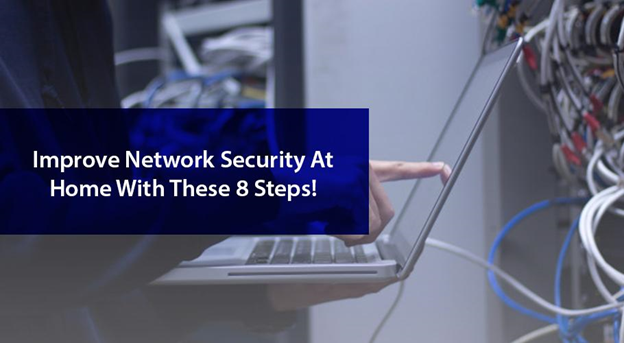
Cybersecurity is a major concern in today’s time. Ever since the COVID-19 pandemic hit globally, companies worldwide implemented remote working, and this meant improving home network security for maximum security. Wireless network security is important in all aspects. You want to make sure you don’t face any cyberattacks when you’re connected to the Wi-Fi.
One way to ensure this is by choosing a reliable internet provider in the first place. AT&T is a popular internet provider that offers secure, reliable, and fast internet across the country. Check AT&T home internet plans and sign up for secure internet at cutthroat prices!
The other way to ensure maximum security of your network is by following the steps below!
- Change Your Wi-Fi’s name
One way to secure your home network is by changing the default name of your wireless home network. Naming your Wi-Fi something unique and rare protects you from malicious attackers. When someone wants to attack a wireless network, they usually go for networks named after specific routers. This helps them identify the vulnerabilities a specific router model has and work their way in exploiting them.
We advise you to avoid naming your Wi-Fi after your own name because it’s easily identifiable for the attacker to know which one is yours. Avoid adding any personal info in the name of your network to avoid exposure to identity theft.
- Set a Strong Wi-Fi Key or Password
Encrypting your home network is super important to maintain security from potential attacks. Many home routers come with preset keys, and these keys are usually made up of numbers only. Since everything is on the internet now, it’s not easy for hackers to download some tools and easily break through the network in a few minutes. This is why when you’re setting up your network, make sure to change the username and password. Choose a password that includes special characters, numbers, and letters.
Typically, a good password is usually 12-15 characters long. Don’t choose a combination that is hard to remember; instead, just choose a long password. The longer it is, the more difficult it is to guess it.
Speaking of passwords, it’s equally important to change all the devices connected to the Wi-Fi network at home. These devices can easily be accessed through the network when a malicious attack occurs. Your network acts as an open door for cybercriminals, allowing them inside gives them access to the other rooms, which are your devices.
Make sure to keep changing your passwords across all devices now and then.
- Activate Network Encryption To Maximize Security
Have you ever heard about WEP, WPA, or WPA2? You probably have if you’ve dug in deep into the details of your network. But let’s be honest; most of us never really understood the terminology. To simplify it for you, these are different encryption languages. The most secure encryption technology is WPA2.
WPA2 is a security protocol known as Wi-Fi Protected Access 2. It ensures the Wi-Fi network’s traffic is encrypted, which means it more secure than the old WEP. Most products now use WPA2 security. The WPA2 technology comes with security features for both service providers and users.
- Turn Off Your Wi-Fi When You Leave The House
Disabling your wireless network when you leave the house improves your network’s security since hackers won’t get the opportunity to crack through. Doing the same with all devices connected to your network maximizes security as well. Some advantages of switching off the network are:
-
- No power surges: Turning off the network device lowers the chances of electric power surges causing damages.
- More security: Disabling the network maximizes security by eliminating the possibility of being hacked.
By doing so, you’re reducing noise, maximizing security, and lowering the risk of power surges.
- Position The Router Correctly
Many people overlook this technique, but it’s helping a lot in improving network security. Where the router is located in your home determines how exposed your network is. By placing the router in the middle of the house, not only provides equal access to the internet to all corners, but it prevents the network signal range reach outside your house, making it less accessible to malicious hackers.
- Change The Router’s Default IP Address
This technique isn’t that common or practiced by many. Your network comes with a preset IP address, and to protect it from being hacked, you can change the default IP address to something less common.
You can do so by logging in as an admin, adding your username and password on the login page, choosing the LAN network, changing the IP address to whatever you like, and finally saving it. Once you’ve updated the new IP address, you’ll need to add the new address to the web browser bar. This ensures maximum security from all fronts preventing malicious attacks from happening.
- Update The Router’s Software
The software is what keeps your wireless network running smoothly. Without the proper software, it’s impossible to access high-speed internet. The router’s firmware is a critical part of the system. It can have flaws and technical errors that make the router vulnerable to threats.
However, with that said, many routers come without the option to auto-update their software, which is why you’ll need to do this manually. Neglecting this step allows cybercriminals to exploit the network and attack it with malicious activities. Updating your software is critical for digital security at home. Not only does it protect your network system, but it keeps the connected devices safe from malicious attacks.
- Install A Firewall
Antivirus software and firewalls are more than just software programs. They ensure maximum security of all devices, systems, and networks through multiple checks and self-cleaning features. Firewalls come in hardware forms as well, which adds one more layer of security.
You will find that the best wireless routers come with a built-in firewall that protects your network on all fronts. Once you figure out if your router has one, you can activate it for an extra security layer. If it doesn’t, we suggest you install a firewall device. Leave no security hole open to malicious attacks.
Connect your devices and wireless network to the latest firewall for multiple layers of security. With that said, update the antivirus programs on your devices as well.
The Bottom Line
To enhance network security at home, make sure the router and devices connected to the network are updated with the latest software. All security patches are applied wherever possible. The router’s name isn’t easily identifiable, and you disable the network when you’re not home. Following these steps enhance network protection across all your devices!
Baldwin Jackson is a successful digital marketer with expertise in search engine optimization and content marketing. The perfect balance of his analytical ability and creative thinking is what sets him apart from other practitioners in the digital marketing realm. He has helped a lot of small and medium-sized businesses in crafting their digital marketing strategies that are not only cost-effective but delivers results as well.
Baldwin is also a proud father of two kids and a Sports enthusiast. When he is not working, you will find him watching ESPN and NFL network. He has been able to get an amazing package on his favorite channels from Buytvinternetphone.com.





